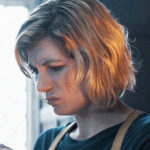I’ve been thinking a lot about compassion in Judaism, and being kind. In that light, I would like everyone to know that my current favorite Jewish supernatural headcanon is that, instead of driving vampires away with crosses or stakes through the heart, we say the Mourner’s Kaddish for them. I mean, that’s just so adorable. You see this threatening undead creature, and instead of yelling murder, you feel bad for them, and you mourn for them. Imagine being a vampire at the receiving end of that, having been chased away for years and years and told you’re a monster when you come across someone who sees you and your existence and accepts that you’re in a pretty bad place and offers help in the best way they can. I’m actually tearing up about this a little. If someone adds to this post I’ll love them forever.
It doesn’t work for zombies.
This is one of the hardest things she learns, in the business. Saying the Mourner’s Kaddish will slow a vampire, to stare at you with wide shocked eyes (and once, memorably, to weep blood-tinged tears), unable or unwilling to lift a hand against you. It will calm a dybbuk, enough to make it stop whatever destruction it’s begun, and almost always enough to start a conversation about why it clings so desperately to the world of the living, what it’s left undone, how it can be freed to move on. You have died, the Kaddish says, and we mourn you as we would mourn our own dead, because someone must.
But there is no soul and no mind left in a zombie, no vestige of the self it once was, nothing left for the Kaddish to speak to.
She says it anyway, with every head-shot, with every flung grenade.
Not because she still hopes one might hear her, but because they are dead, and the dead should be mourned.
…this is gorgeous.
I would buy the hell out of this book.
It almost works on ghosts. The freezing, electric wind of their presence slows to a soft chill like the last breath of winter. The ectoplasmic glow flickers, dims, and steadies. They seem to be listening.
But they do not leave. Jewish or not, and whether or not they knew Aramaic, they seem to sense the Kaddish’s meaning: Blessed is He beyond blessing and song, beyond praise and consolation that is uttered in the world.
In their half-world, half forever lost and half still ours, the ghostly voices lift. No longer do they moan and scream. They sing: May there be peace. Their words linger when the living song has ended, when the mortal must stop for breath. The dead hold their notes. The song rings on.
Perhaps they will sing until there is peace upon us in truth.
One of the things that I really love about this season of Doctor Who is that with the make up of the cast this season, we’re getting the chance to see stories that previously seasons really couldn’t tell with a male Doctor and an overwhelmingly white companion collection. (They never really took much advantage of Martha being a black woman and it was used mostly as a plot device to keep her out of scenes in Family of Blood… am I still bitter about how underused Martha was because she was excellent and deserved better? … perhaps)
But you couldn’t effectively tell a story like Rosa without characters of color who experience first hand the impacts of segregation in he American South. Sure you could have a white Doctor and white companions visit and go ‘segregation is bad, look separate water fountains’ but it’s much more impactful as a lived experience. In Demons of the Punjab, it’s the lived experience of Yaz’s family and it’s not a story that writers would think to use without Yaz as a character. It’s a chance to see an aspect of history not usually touched on in British storytelling, and if it is it’s with a colonial bent. But here you get the lived experience of Yaz’s Nan.
And with the Doctor being a woman, they’re aren’t shying away from pointing out the Doctor’s frustration each time something she’s gotten away with easily in her 12 male forms doesn’t come as easy now that she’s in a female form. In The Witchfinders, of course she’s going to use her psychic paper to show that she’s the witchfinder general, large and in charge. But sexism being what it is, and the psychic paper showing what the person reading it wants to see, of course as soon as it’s a man in power he can’t even fathom that she would be in charge so he reads that she’s an assistant. And tonight gave us yet another story that you couldn’t have told without a female Doctor – the Doctor being tried as a witch. Any other season would’ve had to have one of the companions be the one on trial, but because the Doctor is a woman now she can have that lived experience.
It’s just one more thing that I’m really enjoying about this season. I’ve loved Doctor Who for a long time, and I’ve loved many Doctors, but y’all I am so here for the opportunity for new stories and lived experiences. It opens up so many doors for exciting untold stories on this show and I’m so glad they’re taking advantage of it.
“… Sorry for saying BJ at the Oxfam Gala.” – Mae Martin on biphobia






















